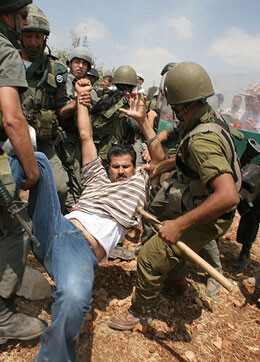29 October 2010

Abdallah Abu Rahmah being arrested by Israeli soldiers at demonstration in Bilin in 2005. (Oren Ziv/ActiveStills)
Representatives from four US human rights groups met with State Department officials on Friday, 22 October and delivered a letter addressed to Secretary of State Clinton signed by more than 5,000 individuals. The letter calls for the US government to demand that Israel free Abdallah Abu Rahmah, a leading Palestinian nonviolent protest organizer. Abu Rahmah, from the West Bank village of Bilin, was sentenced on 11 October in Israeli military court to one year in prison for his part in organizing Bilin’s five-year campaign of civil disobedience to Israel’s construction of a fence and settlements on village land in violation of international law. Abu Rahmah’s conviction has been denounced by the UK Foreign Office, the EU, Human Rights Watch, Amnesty International, B’Tselem and South African anti-apartheid leader Desmond Tutu.
Rob Mosrie, Executive Director of the US Campaign to End the Israeli Occupation, said “Israel’s arrest of nonviolent activists like Abdallah Abu Rahmah mocks President Obama’s call in his Cairo speech for Palestinians to use only nonviolent means to gain their freedom. What kind of message does it send to a community when their nonviolent leadership is jailed?”
The letter delivered to the State Department and addressed to Hillary Clinton was signed by 35 organizations and 5,270 individuals and written before Abdallah Abu Rahmah’s 11 October sentencing. The letter noted that in July 2010 in Krakow at a meeting of the intergovernmental group Community of Democracies, Secretary of State Clinton saluted “civil society activists around the world who have recently been harassed, censored, cut off from funding, arrested, prosecuted, even killed,” and called for coordinated international efforts to defend them. The letter to Clinton continued, “Abdallah Abu Rahmah is one of these activists who, in pursuit of human rights, has been unjustly imprisoned.”
Representatives from Adalah-NY, CodePink, Jewish Voice for Peace and the US Campaign to End the Israeli Occupation stressed to State Department officials that, in the next two weeks, the Israeli government is expected to appeal to lengthen Abu Rahmah’s one year sentence. Last week, an Israeli military court extended the sentence for another Bilin protester, Adeeb Abu Rahmah, from one year to 18 months in response to an Israeli government appeal.
Rebecca Vilkomerson of Jewish Voice for Peace explained, “In an effort to crush the growing movement of unarmed Palestinian resistance to Israeli occupation, Israel has imprisoned Abdallah Abu Rahmah, and other protest organizers from Bilin and the neighboring village of Nilin, charging them with ‘incitement’ and organizing ‘illegal protests’ under draconian Israeli military orders that have not been used since the first intifada and that effectively outlaw freedom of expression and peaceful protest.”
Human Rights Watch called Abdallah Abu Rahmah’s conviction “the unjust result of an unfair trial,” noting that he was convicted of inciting stone throwing based on statements of arrested children who had no legal representation, said they were coerced by their Israeli interrogators into making the accusations and retracted them in court. Human Rights Watch, Amnesty International and the Israeli human rights organization B’Tselem all criticized the 1967 Israeli military order 101 under which Abdallah Abu Rahmah was convicted for its extremely broad definition of incitement — “attempting to … influence public opinion in the area in a way that may disturb the public peace or public order” — and its requirement for a permit for any gathering of ten persons or more listening to a speech or walking for purposes that can be interpreted as political. Though the Israeli military generally films the demonstrations in Bilin, the Israeli military did not present a single piece of video evidence linking Abdallah Abu Rahmah with incitement or violence.
The Israeli military began the latest wave of protest arrests around September 2009, also arresting protest organizers and boycott activists Mohammad Othman and Jamal Juma’ of the Palestinian organization Stop the Wall. After being held for a period without access to their lawyers and without charges, both Othman and Juma’ were released after three and a half months and four weeks, respectively. Twenty Palestinians have been killed in protests against the wall since 2004, including one individual from Bilin and five from Nilin. Seventy-nine protesters from Bilin have been arrested since 2004, and 116 protesters from Nilin have been arrested since May 2008.
During protests the Israeli military has killed two US citizens, Rachel Corrie and Furkan Dogan, and seriously injured two others, Tristan Anderson and Emily Henochowicz.